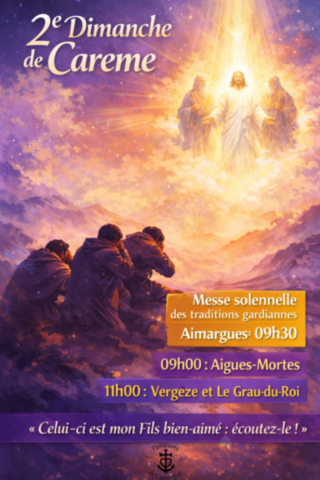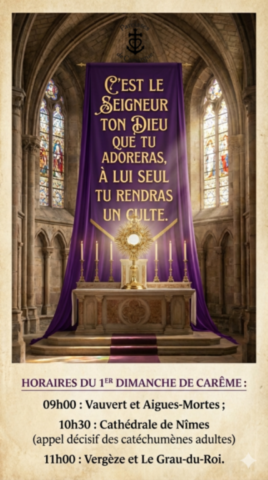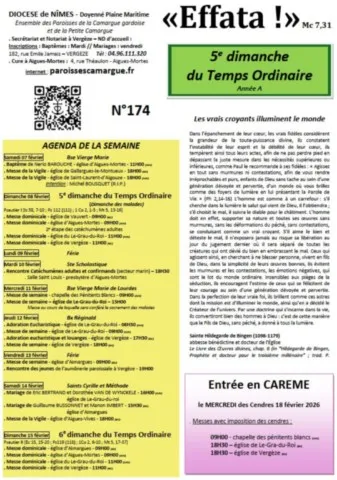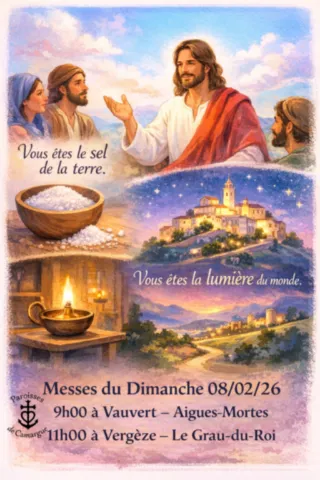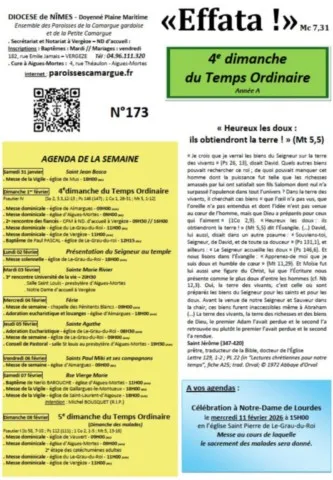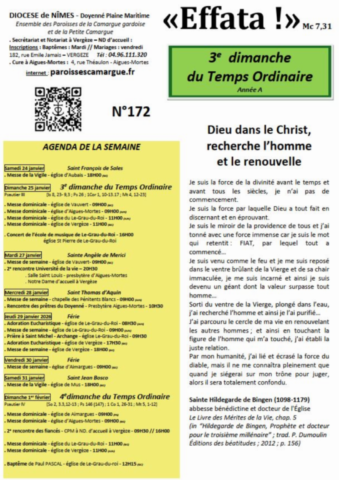Effata! Parish Bulletin
Click on the image of the Effata of the week to download the parish bulletin in PDF format
Receive our newsletter - Subscribe
No 177 - 2nd Sunday of Lent - Year A
The Revelation of Glory
Let all eyes be closed, lest they be dazzled by such a vivid and brilliant light; let every tongue be silent, lest it tarnish such perfect beauty by attempting to uncover it.
Here, every mind must be humbled and worshipped, lest it be overwhelmed by the immense weight of the glory of divine Wisdom, by attempting to fathom it.
Here, however, is the idea that the Holy Spirit, to conform to our weakness, gives us in the Book of Wisdom, which He composed solely for us. Eternal Wisdom is “a pure outpouring of the glory of the Almighty; therefore, nothing defiled enters it.” She is a reflection of eternal light, a spotless mirror of God’s activity, an image of his excellence” (Wis 7:25-26) (…)
It is in this sovereign beauty of Wisdom that God the Father has found his delight in eternity and in time, as this great God himself expressly affirmed on the day of his baptism and transfiguration: “Behold my beloved Son, in whom I alone find my delight” (Mt 3:17; 17:5).
Eternal Wisdom, in order to draw closer to humanity and to show them her love more tangibly, went so far as to become human, to become a child, to become poor, and to die for them on the cross.
Saint Louis-Marie Grignion de Montfort (1673-1716)
preacher, founder of religious communities
The love of eternal Wisdom; 15.16.19.70 (in Christian Readings for Our Time, sheet I84; trans. Orval; © 1973 Orval Abbey)
No 176 - 1St Sunday of Lent - Year A
“The tempter approached” (Mt 4:3)
Sin is a terrible thing, and transgression a severe and cruel disease of the soul, for it severs the soul's nerves and thus works toward eternal fire. (…)
Yet you are not the only instigator of evil deeds: there is another whose perversity whispers them to you: the devil.
This being whispers evil to all, but he does not triumph over those who refuse to listen to him.
Hence the words of Ecclesiastes: “If the spirit of him who has power rises against you, do not leave your place” (Eccl 10:4), lock your door, keep him far from you, and he will not harm you.
If you lightly welcome the suggestion of a desire, through your considerations, it will sink its roots deep within you, chain your intellect, and drag you into the pit of misery.
But perhaps you will say, “I am a ‘faithful’ person, and desire does not control me, even if I pause to reflect on it.”
Do you not know that a root, by clinging tightly, can break even a stone?
Do not welcome the seed, for it will shatter your faith.
Before it blossoms, uproot the evil, lest your initial nonchalance later lead you to dwell on axes and fire.
Begin by healing your poor eyesight in due course, so that you will not have to seek a doctor once you have gone blind.
Saint Cyril of Jerusalem (313-350)
Bishop of Jerusalem and Doctor of the Church
Baptismal Catechesis No. 2, 1-3 (Catecheses, coll. The Fathers in Faith No. 53-54; trans. J. Bouvet, Éd. Migne 1993; pp. 41-42)
No. 175 - 6th Sunday in Ordinary Time - Year A
Dear friends,
After the Senate voted against it, the bill on “active assistance in dying” has returned to the National Assembly.
Since Monday, the text under debate has clearly led our country down the path of euthanasia and assisted suicide.
Far from the unanimity hoped for by some, this issue is causing immense concern and strong opposition from many healthcare professionals, patients, the elderly, and people with disabilities. We, the bishops of France, have spoken out extensively on this subject, forcefully reaffirming the inalienable dignity of all human life and calling for the full development of palliative care throughout the country: “Life is not cared for by giving death.”
In communion with Pope Leo XIV, who calls us to “defend the intrinsic dignity of every human person, even as our world struggles to find value in human life, even in its final hour,” we wish to invite all Catholics to a day of prayer and fasting on February 20, the first Friday of Lent, so that, through fasting and prayer, we may become ever more open to the gift of the Spirit and that the consciences of all, free from ideology and haste, may be enlightened for the common good.
As we journey toward Easter, where we celebrate the victory of life over death, we assure you of our prayers.
Conference of Bishops of France
No. 174 - 5th Sunday in Ordinary Time - Year A
True Believers Illuminate the World
In the outpouring of their hearts, true believers consider the grandeur of divine omnipotence. They recognize the instability of their minds and the weakness of their hearts, and thus temper all their actions, so as not to lose their footing by exceeding the proper measure in matters of need, whether greater or lesser, as Paul advises his followers: “Do everything without grumbling or quarreling, so that you may become blameless and pure, children of God without blemish in a crooked and perverse generation, in a world where you shine like stars in the sky as you hold fast the word of life.” (Philippians 2:14-16)
Humanity is like a crossroads: if it seeks salvation from God in the light, it will find it; if it chooses evil, it will follow the devil to punishment. Indeed, man must bear his nature and all his works without murmuring, without the distortions of sin, without disputing, conducting himself as a true believer.
If he loves good and hates evil, he will never jeopardize his liberation on the Day of Judgment, when he will be separated from all creatures who have deviated from good by embracing evil. Those who act in this way, seeking to harm no one, live as children of God. In the simplicity of their good works, they avoid murmuring and disputing, the negative emotions that are the lot of the ordinary world. Impervious to the snares of seduction, they inspire the esteem of those who praise their courage within a misguided and corrupted generation.
In the perfection of their true faith, they shine like those stars whose mission is to illuminate the world, as the Creator of the universe decreed. Through a doctrine embodied in life, they will convert many to God: it is in this way that the sinless Son of God gave light to all.
Saint Hildegard of Bingen (1098-1179)
Benedictine abbess and Doctor of the Church
The Book of Divine Works, chap. 6 (in “Hildegard of Bingen, Prophet and Doctor for the Third Millennium”; trans. P.
No. 173 - 4th Sunday in Ordinary Time - Year A
“Blessed are the meek, for they shall inherit the earth!” (Mt 5:5)
“I believe that I shall see the goodness of the Lord in the land of the living” (Ps 27:13), said David. What other blessings could this king have sought? What could this man lack, whose power was such that the riches he amassed satisfied his son Solomon, whose opulence no one has surpassed in the whole world?
In the land of the living, he sought those blessings “that no eye has seen, no ear has heard, no mind has conceived, but God has prepared for those who love him” (1 Cor 2:9). “Blessed are the meek, for they shall inherit the earth!” (Mt 5:5) says the Gospel. (…) David, too, said in another psalm: “Remember, O Lord, David, and all his meekness” (Psalm 131:1), and elsewhere: “The Lord accepts the meek” (Psalm 146:6). And we read in the Gospel: “Learn from me, for I am meek and humble in heart” (Matthew 11:29). And Moses, too, was a type of Christ, whom Scripture presents to us as the meekest of men (cf. Numbers 12:3).
Yes, the land of the living is where the Lord’s bounty is prepared for the saints and the meek. Before the coming of our Lord and Savior in the flesh, this bounty was inaccessible even to Abraham. (…) The land of the living, the land of God’s riches and blessings, the first Adam lost it and the second found it again, or rather, the first lost it and the second restored it.
Saint Jerome (347-420)
Priest, translator of the Bible, Doctor of the Church
Letter 129, 1-2; PL 22 (in “Christian Readings for Our Time”, sheet A25; trans. Orval; © 1972 Orval Abbey)
No. 172 - 3rd Sunday in Ordinary Time - Year A
"God in Christ seeks humanity and renews it."
I am the power of divinity before time and before all ages; I have no beginning.
I am the power by which God made all things, discerning and testing.
I am the mirror of the providence of all, and I thundered with immense power, for I am the resounding word: FIAT, by which all things began…
I came like fire and rested in the burning womb of the Virgin and her immaculate flesh. I became incarnate and thus became a giant whose worth surpasses all humankind…
Emerging from the womb of the Virgin, plunged into water, I sought humanity and thus purified it…
I traversed the circle of my life, renewing other people; and thus, by touching the face of the person who touched me, I established the right relationship.
Through my humanity, I have bound and crushed the power of the devil, but he will only fully know me when I sit upon my throne to judge, then he will be utterly confounded.
Saint Hildegard of Bingen (1098-1179)
Benedictine abbess and Doctor of the Church
The Book of the Merits of Life, chap. 5
(in “Hildegard of Bingen, Prophet and Doctor for the Third Millennium”; trans. P. Dumoulin
Éditions des béatitudes; 2012; p. 156)
No. 171 - 2nd Sunday in Ordinary Time - Year A
"Behold the Lamb of God"
"John saw Jesus coming toward him and said, 'Behold, the Lamb of God, who takes away the sin of the world!' For one lamb died for all, redeeming for God the Father the whole flock of those who dwell on the earth.
One died for all, to subject them all to God; one died for all to win them all... Indeed, we live in our many sins and, as a result, we had a debt of death to pay and have become perishable. This is why the Father gave his Son as a ransom for us (Jn 3:16; Mk 10:45), one for all, for all things are in him and he is above all."
One died for all, so that we might all live in him. For death, having swallowed up the lamb sacrificed for all, has restored them all in him and with him. For we were all in Christ, who died for us and in our place, and who rose again.
Sin is the origin and cause of death; once sin is destroyed, how can death escape complete destruction? Once the root is dead, how can the sprout that springs from it still be preserved? Once sin is blotted out, for what sin must we still die? Let us therefore joyfully celebrate the sacrifice of the lamb, saying, “Death, where is your victory? Hell, where is your venomous sting?” (ICC 15:55; Hos 13:14)...
“Christ redeemed us from the curse of the law by becoming a curse for us” (Gal 3:13), so that we might escape the curse of sin.
Saint Cyril of Alexandria (380–444), Bishop and Doctor of the Church
Commentary on the Gospel of John, 2 Prologue PG 73,192 (trans. Delhougne, The Fathers Comment, p. 86 rev.)
N° 170 - The Baptism of the Lord - Year A
In the image of the Son, the holiness of sons!
The heavenly Father has taken it upon himself to set for us, (…) our ideal of holiness. He has predestined us to become like, not any creature, nor an angel, but his Son, (…).
Saint Paul reveals this thought of the Father when he says: “He predestined them to be conformed to the image of his Son” (Rom 8:29). God assigns us a divine model of perfection. He desires to find in us the features of his incarnate Son, and, by the same token, to see our souls shine with the reflection of his own holiness. (…)
If God, the ocean of perfection, is incomprehensible to all created intelligence, he himself grasps at once, in his infinity, the fullness of his greatness; He expresses his knowledge in a single thought, in a single word, his Word. To this Word, he communicates his entire divine life, all his light, all that he is.
This generation within the Father, being the very life of God, has never begun and will never end. At this very moment as I speak to you, the Father, in boundless exultation, says to his Son: “You are my Son; today—that is, in an eternal present—I have begotten you” (Psalm 2:7). This Son, the Father has given us as the model and source of all holiness. “In him are all the treasures of God’s wisdom and knowledge” (Colossians 2:3).
An eternity of contemplation will not suffice to exhaust the knowledge of this mystery and to thank God for this blessing. (…) If, as Saint Thomas Aquinas writes, “the natural and eternal filiation of the Word in the bosom of the Father is the sublime example of our adoptive filiation” (Sermo, XXXI, 3), then the holiness proper to the humanity of the true and only Son of God must also serve as a model for the holiness of adopted children.
Blessed Columba Marmion (1858-1923) - Abbot
Christ, Model and Source of Priestly Holiness (The Ideal Christ of the Priest, Éd. de Maredsous, 1951, pp. 29-34; rev.)
N° 169 - Epiphany of the Lord - Year A
SAVE THE DATE
1226 – 2026
A Year of Saint Louis
This new year, 2026, marks the beginning of a "Year of Saint Louis" in the parish of Aigues-Mortes, as part of the 800th anniversary of the coronation of Louis IX.
Speakers will address the parish throughout the year, exploring the life of Saint Louis from various perspectives.
For its first event, the parish is delighted to welcome
Gilbert Collard, Attorney at Law,
who will speak on the theme of justice:
"Saint Louis and the Mystique of Justice"
A lecture open to all, to better understand the spiritual and human relevance of Saint Louis today:
Saturday, January 24, 2026, at 3:00 PM
at Notre-Dame Church. Sablons in Aigues-Mortes
- ALLIANCE VITA is offering its University of Life program in our parishes in Aigues-Mortes and Vergèze this year (2026). The theme will be: "The Body in All Its States."
What do we experience before birth? Does the body have a memory? Is it possible to grow old happily? Are we free to choose how we die? What does donating gametes entail? Can we do everything with our bodies? …
The sessions will take place:
Tuesdays, January 20 and 27, and February 3
in the late afternoon (time to be confirmed)
To register:
https://www.alliancevita.org/universite-de-la-vie-accueil/inscriptions/
N° 168 - The Holy Family of Jesus, Mary and Joseph - Year A
My Jesus, inspire me with what I should think of Your hidden life…
“He went down with them to Nazareth and was obedient to them” (Lk 2:51)… He went down, sank into the depths, humbled Himself… it was a life of humility: God, You appeared as man; man, You made Yourself the least of men; it was a life of abjection, to the very lowest of the low; You went down with them to live their life, the life of poor workers, living by their labor; Your life, like theirs, was poverty and toil; they were obscure, You lived in the shadow of their obscurity. You went to Nazareth, a small, lost town, hidden in the mountains, from which “nothing good came” (Jn 1:46), it was said; It was retreat, a separation from the world and its capitals. You lived in this retreat…
You were submissive to them, submissive as a son is to his father and mother; it was a life of submission, filial submission. You obeyed in all things as a good son would.
If a desire of your parents was not in accordance with your divine calling, you did not fulfill it. You obeyed “God rather than men” (Acts 5:29), as when you stayed three days in Jerusalem. But, except in cases where your vocation required you not to yield to their desires, you yielded to them in every way, being in all things the best son, and consequently, not only obeying their every wish, but anticipating them, doing everything that could please them, console them, make their lives sweet and pleasant, striving with all your heart to make them happy, being the model for sons, and showing every possible care for your parents, to the extent, of course, that your vocation allowed… (…) This is what your life in Nazareth was like (…)!
Your life was that of the model for sons, living between a poor, working-class father and mother.
Saint Charles de Foucauld (1858-1916)
Hermit and missionary in the Sahara
Retreat in Nazareth (Spiritual Writings of Charles de Foucauld, Hermit in the Sahara, Apostle of the Tuareg; Ed. J. de Gigord, 1964; pp. 56-58; rev.)
N° 167 - Nativity of the Lord - Year A
for Christmas
December 24, 2025
This year we celebrated the 1700th anniversary of the Council of Nicaea.
In the 4th century, in the face of the heresy of Arius, who contested the divinity of Christ, it vigorously affirmed that Jesus is both man and God.
This is the heart of our faith.
Because it is God himself who came, “for us men and for our salvation.”
He did not delegate this to another.
And he came in our human condition.
The Creed says that “he took flesh from the Virgin Mary.”
Yes, he came in the flesh, assuming our human frailty so that everything within us might be embraced, saved, redeemed, and restored.
This is the grandeur of Christmas.
By studying the Scriptures, the Fathers of the Council of Nicaea understood and confessed this profound mystery: this child of Bethlehem, this Messiah who preached on the roads of Judea and Galilee, who died and rose again, is the living God, the thrice-holy God, the Creator God who came to us in our humanity because he cares for us and calls us to himself.
This is what gives meaning to this celebration, to the joy of holidays, meals, reunions, and gifts: we are loved by God to this extent, to this degree. He does not disdain the earth: he comes to dwell on it.
That is why he is present here, in the midst of these celebrations; he gives us his joy and his peace.
Let us not forget the peoples who are suffering from war, especially those of Ukraine and Russia.
Let us not forget Gaza, Israel, Iran, our dear brothers and sisters in Lebanon, and all those living in conflict zones.
May the peace of Jesus reach them and enlighten them.
May the Lord bless you!
Bishop of Nîmes, Uzès, and Alès
N° 166 - 4th Sunday of Advent - Year A
As we know, only Luke introduces the episode of Jesus' birth and the shepherds' visit in his Gospel, chapter 2, verses 1-20.
While it is said that Mary gave birth in a manger or stable, there is no mention of the presence of an ox and a donkey. They appear in a 6th-century apocryphal text known as "Pseudo-Matthew."
The Bible, however, is familiar with this pair of animals, and in Deuteronomy 22:10 it says: "You shall not plow with an ox and a donkey together." Why?
Because they symbolize opposing, incompatible forces, especially since the donkey cannot bear the yoke (the Torah) as the ox does.
Jewish tradition offers several interpretations of this verse:
1/ The most traditional interpretation is to see the donkey as symbolizing Egypt (idolatry) and the ox as symbolizing Israel (monotheism). It is worth noting that Joseph is considered the one who harnessed the two animals, since he crossed over to the Egyptian side, and his family (Jacob and his brothers) accepted living in an idolatrous land, driven by famine. The people of Israel found themselves enslaved by Pharaoh. Moses, from the tribe of Levi, disperses the Egyptians (donkey) and leads the ox (Israel) out of slavery.
It is worth noting that Moses takes Joseph's bones with him after his death so that he may return to his original destination: the Promised Land, Canaan.
2/ The Talmud, after the destruction of the Second Temple, updates this interpretation, seeing the donkey as representing Rome in place of Egypt (still oppression and idolatry) and the ox as still representing Israel. Two irreconcilable enemy peoples who, if yoked together, would ravage the world.
3/ But Isaiah, in chapter 1, verse 3, at the very beginning of the book, mentions this strange pairing to present them to us as a symbol of wisdom: “An ox knows its owner, and a donkey its master’s manger.” He reverses the inevitably destructive aspect of this duo by setting them free.
This is a messianic vision that Christians, even belatedly, embraced.
Here we are faced with what is called a “RIDOUCH,” a new interpretation in light of the Gospels, by those who recognized the Messiah in the resurrected Jesus and who, therefore, offer new readings.
One could then interpret it as follows:
The two animals in the stable, warming the newborn child with their breath, symbolize the Nations and Israel in the finally arrived messianic time. The nations, reconciled with Israel, share the same manger and have the same master.
Catherine Poujol
Delegate of the Diocese of Nîmes for relations with Judaism
N° 165 - Gaudete Sunday - 3rd Sunday of Advent - Year A
Wednesday, December 24:
Christmas Eve Masses
- 6:30 PM: Vauvert Church
- 6:30 PM: Vergèze Church
- 6:30 PM: Le Grau-du-Roi Church
- 11:30 PM: Aigues-Mortes Church Christmas Carol Vigil
- 00:00 : Midnight Mass
Thursday, December 25:
Solemn Masses of the Holy Day of the Nativity
- 9:00 AM: Aigues-Mortes Church
- 9:00 AM: Aimargues Church
- 11:00 AM: Le Grau-du-Roi Church
- 11:00 AM: Vergèze Church
Confessions Available
Saturday, December 20:
- Vergèze Church, 10:00 AM to 12:30 PM
Tuesday, December 23:
- Vauvert Church, 9:30 AM to 10:30 AM
- Le Grau-du-Roi Church, 6:00 PM to 7:00 PM
Wednesday, December 24:
Aigues-Mortes Church, 9:00 AM to 10:00 AM
N° 164 - 2nd Sunday of Advent - Year A
Wednesday, December 24:
Christmas Eve Masses
- 6:30 PM: Vauvert Church
- 6:30 PM: Vergèze Church
- 6:30 PM: Le Grau-du-Roi Church
- 11:30 PM: Aigues-Mortes Church
Christmas Carol Vigil
- 00:00 : Midnight Mass
Thursday, December 25:
Solemn Masses of the Holy Day of the Nativity
- 9:00 AM: Aigues-Mortes Church
- 9:00 AM: Aimargues Church
- 11:00 AM: Le Grau-du-Roi Church
- 11:00 AM: Vergèze Church
Confessions Available
Tuesday, December 23:
Vauvert Church from 9:30 AM to 10:30 AM
Le Grau-du-Roi Church from 6:00 PM to 7:00 PM
Wednesday, December 24:
Aigues-Mortes Church from 9:00 AM to 10:00 AM
N° 163 - 1st Sunday of Advent - Year A
Yes, let it be the continual occupation of your heart! At work, in your various duties, while traveling, do not tire of repeating it. Whether you are eating or sleeping, in all the constraints of nature, meditate on it.
This thought will become your formula for salvation, which will not only protect you from all attacks of demons, but will also purify you from all vice and earthly impurity, thereby raising you to the contemplation of heavenly and invisible things, to that ineffable fervor of prayer which so few know from experience.
Let sleep close your eyes to these words, so that by dint of repeating them, you make a habit of repeating them even in your sleep. Let them be, upon waking, the first thing that comes to your mind, before any other thought. Say them on your knees, as you get out of bed, and let them accompany you in all your actions, never leaving you.
You will meditate on them, according to the precept of Moses, “sitting in your house and walking along the roads” (Deuteronomy 6:7 LXX), both while sleeping and while waking. You will write them on your lips, you will engrave them on the walls of your house and in the sanctuary of your heart: so that they may accompany you like your sole refrain, when you prostrate yourself in prayer, and when, afterward, you rise to follow the ordinary course of life, as your constant prayer.
Yes, let the soul hold onto this word incessantly, until, by dint of repeating and meditating on it without ceasing, it has acquired the firmness to refuse and reject far from itself the riches and ample possessions of all kinds of thoughts, and thus, confined to the poverty of this humble verse, it may arrive, by an easy path, at evangelical beatitude.
Saint John Cassian (c. 360-435)
founder of a monastery in Marseille
On Prayer, Chapter X; SC 54 (Conferences VIII-XVII; trans. E. Pichery, ed. du Cerf, 1958; p. 89-90-91)
N° 162 - CHRIST THE KING of the Universe - Year C
Yes, let it be the continual occupation of your heart! At work, in your various duties, while traveling, do not tire of repeating it. Whether you are eating or sleeping, in all the constraints of nature, meditate on it.
This thought will become your formula for salvation, which will not only protect you from all attacks of demons, but will also purify you from all vice and earthly impurity, thereby raising you to the contemplation of heavenly and invisible things, to that ineffable fervor of prayer which so few know from experience.
Let sleep close your eyes to these words, so that by dint of repeating them, you make a habit of repeating them even in your sleep. Let them be, upon waking, the first thing that comes to your mind, before any other thought. Say them on your knees, as you get out of bed, and let them accompany you in all your actions, never leaving you.
You will meditate on them, according to the precept of Moses, “sitting in your house and walking along the roads” (Deuteronomy 6:7 LXX), both while sleeping and while waking. You will write them on your lips, you will engrave them on the walls of your house and in the sanctuary of your heart: so that they may accompany you like your sole refrain, when you prostrate yourself in prayer, and when, afterward, you rise to follow the ordinary course of life, as your constant prayer.
Yes, let the soul hold onto this word incessantly, until, by dint of repeating and meditating on it without ceasing, it has acquired the firmness to refuse and reject far from itself the riches and ample possessions of all kinds of thoughts, and thus, confined to the poverty of this humble verse, it may arrive, by an easy path, at evangelical beatitude.
Saint John Cassian (c. 360-435)
founder of a monastery in Marseille
On Prayer, Chapter X; SC 54 (Conferences VIII-XVII; trans. E. Pichery, ed. du Cerf, 1958; p. 89-90-91)
N° 161 - 33rd Sunday in Ordinary Time - Year C
Truly, nothing lasts, nothing remains in the same state, as you well see; but even kings pass away, princes fall, the mighty masters of the earth die like mere mortals (cf. Psalm 81:7); And those who have been married for a time separate, whether they abandon their spouse or are abandoned by them.
Beauty soon fades, youth is fleeting, pleasure is ephemeral; wealth dissipates, and every possession, like the dream of a shadow, recedes from those who think to hold onto it. One finds only lamentation and mourning in the adversity and misfortune of mortals. (…)
And almost no one strives for what is stable and lasting (…).
But you, my brothers, oh! How and where were you called, and how did you ascend the mountain of the Lord (cf. Ps 23:3)? How do you contemplate the wonders of heavenly life? (…) May it please the God who has raised you to this promontory to strengthen and steadfast you, so that you may always do what pleases him in holiness and righteousness (cf. Lk 1:75) (…). Therefore, have no fear except for the living God (cf. Lk 12:5; Rev 14:7), my children!
Saint Theodore the Studite (759-826)
monk in Constantinople
Catechesis (The Great Catecheses, coll. Eastern Spirituality no. 79, trans. F. de Montleau, ed. Bellefontaine, 2002, pp. 279-281; rev.)
N° 160 - Dedication of the Lateran Basilica - Year C
In the communion of saints, let us pray for our departed.
The Work of Our Lady of Suffrage
Founded 150 years ago by Father Firmin Serre, Chaplain of the Hôtel-Dieu in Nîmes, who had himself been encouraged by the holy Curé of Ars, the Work of Suffrage has always been approved by the Sovereign Pontiffs. Its Statutes and Internal Regulations were revised and brought into compliance by Bishop Robert Wattebled of Nîmes on August 4, 2007.
The Our Lady of Suffrage Association has received a mission within the Church to pray for the souls in Purgatory.
N° 159 - Saturday, November 1st: All Saints' Day - Sunday, November 2nd: All Souls' Day
Pilgrimage Registration
At the Rochefort-du-Gard Shrine:
November 15, 2025 – all day
Jubilee Pilgrimage of the Parishes of the Petite Camargue
Participation/person: €65
(transportation – lunch – lecture – visit of the shrine)
Departure and return: Grau-du-Roi and Vergèze
At the Lourdes Shrine: Parish Pilgrimage
December 7 and 8, 2025
Participation/person: €210
Single room supplement: €50
Registration before November 9
Registration forms available after services
or downloadable from the parish website
N° 158 - 30th Sunday in Ordinary Time - Year C
Pilgrimage Registration
At the Rochefort-du-Gard Shrine:
November 15, 2025 – all day
Jubilee Pilgrimage of the Parishes of the Petite Camargue
Participation/person: €65
(transportation – lunch – lecture – visit of the shrine)
Departure and return: Grau-du-Roi and Vergèze
At the Lourdes Shrine: Parish Pilgrimage
December 7 and 8, 2025
Participation/person: €210
Single room supplement: €50
Registration before November 9
Registration forms available after services
or downloadable from the parish website
N° 157 - 29th Sunday in Ordinary Time - Year C
Prayer is absolutely necessary for the happiness of persevering in God's grace after receiving it in the sacrament of Penance.
With prayer you can do anything; you are, so to speak, masters of God's will, if I may say so; and without prayer, you are capable of nothing, and this alone is enough to show you the necessity of prayer.
All the saints began their conversion with prayer and persevered through prayer; and all the damned were lost through their neglect of prayer.
I say, therefore, that prayer is absolutely necessary for us to persevere. (…)
But the prayer of which I speak, which is so powerful with God, which draws so many graces upon us, which even seems to bind God's will, which seems, so to speak, to force Him to grant us what we ask of Him, is a prayer offered in a kind of despair and hope. I say despair, considering our unworthiness and the contempt we have shown God and His graces, recognizing ourselves unworthy to appear before Him and dare to ask for our grace, we who have already received it so many times, and have always repaid it with ingratitude, which must lead us, at every moment of our lives, to believe that the earth will open beneath our feet. (…)
I say hope, representing the greatness of God's mercy, His desire to make us happy, what He has done to merit heaven for us. Inspired by such a consoling thought, we will turn to Him with great confidence. (…)
This, my brothers, is the prayer I wish to speak of, which is absolutely necessary for us to receive our forgiveness and the precious gift of perseverance.
Saint John-Marie Vianney (1786-1859) - Priest, Curé of Ars
Sermon for the Second Sunday after Easter
(Sermons of Saint John the Baptist Marie Vianney, Curé of Ars, vol. 2; Ed. Ste Joan of Arc, 1982; pp. 32-34)
N° 156 - 28th Sunday in Ordinary Time - Year C
"As they journeyed, they were cleansed."
Sinners must hear this word and make the effort to understand it.
It is easy for the Lord to forgive sins.
Often, in fact, the sinner is forgiven before coming to the priest.
In reality, he is healed the very moment he repents.
Indeed, whatever the moment of his conversion, he passes from death to life...
Let him remember, however, what kind of conversion this is.
Let him listen to what the Lord says: "Return to me with all your heart, with fasting, weeping, and mourning!
Rend your hearts, not your garments" (Joel 2:12f).
Every conversion must therefore take place in the heart, within.
"One of them, seeing that he was healed, turned back, glorifying God with a loud voice."
In reality, this man represents all those who have been cleansed in the waters of Baptism or healed by the sacrament of Penance.
They no longer follow the devil, but imitate Christ, they walk in his footsteps, glorifying him and giving him thanks, and they do not abandon his service...
"Jesus said to him, 'Get up and go; your faith has saved you.'"
The power of faith, then, is great, for "without it, as the apostle says, it is impossible to please God" (Heb 11:6).
"Abraham believed in God, and God considered him righteous" (Rom 4:3).
It is therefore faith that saves, faith that justifies, faith that heals man in soul and body.
Saint Bruno of Segni (c. 1045-1123) - Bishop
Commentary on the Gospel of Luke, 2:40; PL 165:428 (trans. Delhougne, The Fathers Comment, p. 450)
N° 155 - 27th Sunday in Ordinary Time - Year C
The right way of serving humbles the one who acts. It does not assume a position of superiority over others, even if the latter's situation may be miserable at that moment. Christ took the lowest place in the world—the cross—and, precisely through this radical humility, he redeemed us and constantly helps us. Those who can help recognize that it is precisely in this way that they too are helped. Being able to help is neither their merit nor a claim to pride. This task is a grace.
The more a person works for others, the more they will understand and make their own Christ's words: "We are unremarkable servants." Indeed, they recognize that they act not out of superiority or greater personal effectiveness, but because the Lord has given them this gift. Sometimes, the increase in needs and the limitations of her own actions may expose her to the temptation of discouragement. But it is precisely then that the knowledge that she is, ultimately, only an instrument in the Lord's hands will help her; she will thus free herself from the pretension of having to achieve, personally and alone, the necessary improvement of the world.
Humbly, she will do what she can and humbly entrust the rest to the Lord. It is God who governs the world, not we. We offer him only our services, as far as we can, and as long as he gives us the strength. However, doing what we can, with the strength at our disposal, is the task that keeps the good servant of Jesus Christ always on the move: "The love of Christ urges us on" (2 Cor 5:14).
Benedict XVI - pope from 2005 to 2013
Encyclical “Deus caritas est”, § 35 (trans. © copyright Libreria Editrice Vaticana)
N° 154 - 26th Sunday in Ordinary Time - Year C
The right way of serving humbles the one who acts. It does not assume a position of superiority over others, even if the latter's situation may be miserable at that moment. Christ took the lowest place in the world—the cross—and, precisely through this radical humility, he redeemed us and constantly helps us. Those who can help recognize that it is precisely in this way that they too are helped. Being able to help is neither their merit nor a claim to pride. This task is a grace.
The more a person works for others, the more they will understand and make their own Christ's words: "We are unremarkable servants." Indeed, they recognize that they act not out of superiority or greater personal effectiveness, but because the Lord has given them this gift. Sometimes, the increase in needs and the limitations of her own actions may expose her to the temptation of discouragement. But it is precisely then that the knowledge that she is, ultimately, only an instrument in the Lord's hands will help her; she will thus free herself from the pretension of having to achieve, personally and alone, the necessary improvement of the world.
Humbly, she will do what she can and humbly entrust the rest to the Lord. It is God who governs the world, not we. We offer him only our services, as far as we can, and as long as he gives us the strength. However, doing what we can, with the strength at our disposal, is the task that keeps the good servant of Jesus Christ always on the move: "The love of Christ urges us on" (2 Cor 5:14).
Benedict XVI - pope from 2005 to 2013
Encyclical “Deus caritas est”, § 35 (trans. © copyright Libreria Editrice Vaticana)
N° 153 - 25th Sunday in Ordinary Time - Year C
Through your creative nature a house was built for the thinking being; the first man was made steward of this earthly house here below. And his descendants who came into being receive from you various stewardships: some for the most glorious bodily works, and others to distribute spiritual goods. (…)
You have also placed as faithful steward of the body and the soul, the incorporeal spirit to give to each one what it needs with care, according to its rank: by nourishing the soul with the Word and by caring for the body with sobriety; and between the two, acting as arbiter, it maintains their rank in rectitude.
The body must be ranked as a servant according to your order of creation, and the soul, as a sovereign princess, according to the image of your Archetype.
But I, unfaithful to both, to my own soul and to that of others, have become like the unfaithful steward, who is the type of my cowardice.
This is because, at the end of my life here below, I can neither do good nor beg from those who possess it, for I am ashamed because they will not give me.
But You, liberal in all things, give regret to my impenitent soul, to return to You completely, before I am called to the Judgment Seat, for the judgment of my sins; to forgive me at least part of the debt: to my soul, the fifty measures of oil, to my body, the twenty measures of wheat.
Grant me, also, the grace like the steward to be worthy of Your praise; although I am a son of the world, give me the wisdom to convert from sin!
Saint Nerses Snorhali (1102-1173) - Armenian Patriarch
Second part, § 605-623; SC 20 (Jesus, Only Son of the Father, trans. I. Kéchichian, ed. du Cerf, 1973; p. 158-161)
N° 152 - THE GLORIOUS CROSS - Year C
Not only do we not have to be ashamed of the death of our Lord God, but we should draw from it the greatest confidence and pride. By receiving from us the death he found in us, he most faithfully promised to give us in him the life that we could not have on our own. And if he who is without sin loved us so much that he suffered for us sinners what we deserved in our sin, how will he not, who justifies us, give us what is righteousness? How will he not, who is faithful to his promises and who bore the penalty for the guilty, give their reward? Let us acknowledge without trembling, my brothers, and proclaim that Christ was crucified for us. Let us say it without fear and with joy, without shame and with pride. The apostle Paul saw it, he who made it a title of glory. After recalling the many great graces he received from Christ, he does not say that he glories in these marvels, but he says: "As for me, God forbid that I should boast anywhere but in the cross of our Lord Jesus Christ" (Gal 6:14).
Saint Augustine (354-430)
Bishop of Hippo (North Africa) and Doctor of the Church
Treatise on the Passion of the Lord, 1-2: PLS 2, 545-546 (in Christian Readings for Our Time, sheet F17; trans. Orval; © 1971 Orval Abbey)
N° 151 - 23rd Sunday in Ordinary Time - Year C
Let us proclaim with joy and pride that Christ was crucified for us!
Not only do we not have to be ashamed of the death of our Lord God, but we should draw from it the greatest confidence and the greatest pride.
By receiving from us the death that he found in us, he most faithfully promised to give us in him the life that we could not have on our own.
And if he who is without sin loved us so much that he suffered for us sinners what we would have deserved by our sin, how will he not give us what is righteousness, he who justifies us?
How will he not give the righteous their reward, he who is faithful to his promises and who suffered the penalty for the guilty?
Let us acknowledge without trembling, my brothers, and proclaim that Christ was crucified for us.
Let us say it without fear and with joy, without shame and with pride.
The apostle Paul saw it, he who made it a title of glory. After recalling the many great graces he received from Christ, he does not say that he glories in these marvels, but he says: "As for me, God forbid that I should boast anywhere but in the cross of our Lord Jesus Christ" (Gal 6:14).
Saint Augustine (354-430)
Bishop of Hippo (North Africa) and Doctor of the Church
Treatise on the Passion of the Lord, 1-2: PLS 2, 545-546 (in Christian Readings for Our Time, sheet F17; trans. Orval; © 1971 Orval Abbey)
N° 150 - 22nd Sunday in Ordinary Time - Year C
"God has taken such a low place that no one could be lower than Him."
The Incarnation has its source in the goodness of God… But, one thing appears first, so marvelous, so sparkling, so astonishing, that it shines like a dazzling sign: it is the infinite humility contained in such a mystery… God, the Being, the Infinite, the Perfect, the Creator, the Almighty, immense, sovereign Master of all, becoming man, uniting himself to a human soul and body, and appearing on earth as a man and the last of men… And the esteem of the world, what is it? Was it fitting that God should seek it? Seeing the world from the heights of divinity, everything is equal in His eyes: the great, the small, everything is equally ant, earthworm… Disdaining all these false greatnesses which are, in truth, such extreme pettiness, God did not want to clothe Himself with them… And as He came to earth both to redeem us and to teach us, and to make Himself known and loved, He wanted to give us, from His entry into this world and throughout His life, this lesson of contempt for human greatness, of complete detachment from the esteem of men… He was born, He lived, He died in the deepest abjection and the ultimate opprobrium, having once and for all taken the lowest place so much that no one could ever be lower than Him… And if He occupied with such constancy, such care, this last place, it is to instruct us, to teach us that men and the esteem of men are nothing, worth nothing; (…) it is to teach us that our conversation not being of this world, we must make no account of the figure of this world…, but live only for this kingdom of heaven which the God-Man saw even here below by the beatific vision, and which we must consider constantly with the eyes of faith, walking in this world as if we were not of this world, without concern for external things, occupying ourselves with only one thing: to look at, to love our Heavenly Father, and to do His will…
Saint Charles de Foucauld (1858-1916)
hermit and missionary in the Sahara.
Retreat in Nazareth (Spiritual Writings of Charles de Foucauld, hermit in the Sahara, apostle of the Tuaregs; Ed. J. de Gigord, 1964; p. 54-55)
N° 149 - 21st Sunday in Ordinary Time - Year C
“Make every effort to enter through the narrow gate” (Lk 13:24)
We can have nothing stable in a world where we came only to pass through, and for us, to live is to leave life and pass through each day. (…)
This mutability, man does not only undergo in his body, but in his soul as well, when he strives to rise towards the best.
For under the weight of its mutability the soul is constantly carried towards something other than it is, and if it is not held in its first state by the strict discipline of vigilance, it slides constantly towards the worst.
For by abandoning the one who remains constantly, it has lost the stability it could have retained.
So now its effort towards the best is only a rise against the current.
And if it relaxes in its intention to rise, there it is effortlessly brought back to the depths.
Yes, going up is effort and going down relaxation, and it is through the narrow gate that we will enter, the Lord reminds us: "Make every effort," he says, "to enter through the narrow gate." (Lk 13:24)
At the moment when he is about to speak of entering through the narrow gate, he says first: "Make every effort," because, without fervent contention of the spirit, the flood of this world is invincible, constantly bringing the soul back to baseness.
Saint Gregory the Great (c. 540-604)
Pope and Doctor of the Church
Book XI, SC 212 (Morals on Job, trans. A. Bocognano, ed. du Cerf, 1974; pp. 139-141, rev.)
N° 148 - 20th Sunday in Ordinary Time - Year C
"I have come to bring fire to the earth, and how I wish it were already kindled!" Luke 12:9
Our Lord Jesus Christ lives on earth in souls and grows in them according to the operations of his grace, as he once did in his childhood conversing with his Mother, and he continues his interior life in us when we are his alone. What he began in himself, he continues in his Church, so that the divine life which he communicates to her and which is so glorious to God his Father, will never have an end in eternity. He desires that the whole earth be full of fire, and he has sent it down here only that it may devour the world (cf. Lk 12:49). (…)
There is nothing sweeter, nor gives more rest and consolation to the soul, than to be caught up out of oneself by Jesus Christ and by his divine Spirit, who does not need for this the fiery chariot of Elijah (cf. 2 Kgs 2:11); but which, by its power alone, raises us from the earth into heaven, and from the depths of ourselves transports us into the bosom of God.
I would be unfaithful to Jesus if I did not constantly press your soul to prevent it from resting for a single moment on itself.
Jean-Jacques Olier (1608-1657) - founder of the Sulpicians
Spiritual Readings, 44 (in Christian Readings for Our Time,
file W58; trans. Orval; © 1973 Orval Abbey)
N° 147 - 19th Sunday in Ordinary Time - Year C
“Blessed are you among women” (Luke 1:42)
Who will worthily celebrate the praises of her most holy assumption?
Who can tell with what happiness she left her body, with what happiness she saw her Son, with what joy she advanced towards the Lord, surrounded by the choirs of angels, borne along by the eager zeal of the apostles, while she contemplated the King in his beauty and saw her child awaiting him in glory, free from all sorrow as she had been free from all stain?
She left the abode of her body to dwell eternally with Christ. She passed into the vision of God, and her blessed soul, brighter than the sun, higher than the heavens, nobler than the angels, she breathed it out to the Lord. (...)
Is this not life, when one goes to the source of life? and from life one draws eternal life in an incessant flow? Before her departure, the Virgin Mother had already drunk from this inexhaustible source so that, in her very passage, she would not be touched by the taste of death, even the slightest. Therefore, in going out, she saw life, so well that she did not see death. She saw her Son, so well that she did not suffer separation from the flesh. So, rushing forth, liberated, into such a blessed vision and quenching her thirst in the face, so desired, of God, she found the venerable inhabitants of heaven ready to serve and guide her.
Saint Amadeus of Lausanne (1108-1159) - Cistercian monk, later bishop
Marian Homily VII, SC 72 (Eight Marian Homilies, trans. Dom A. Dumas, Ed. du Cerf, Paris 1960, pp. 197-199, rev.)

